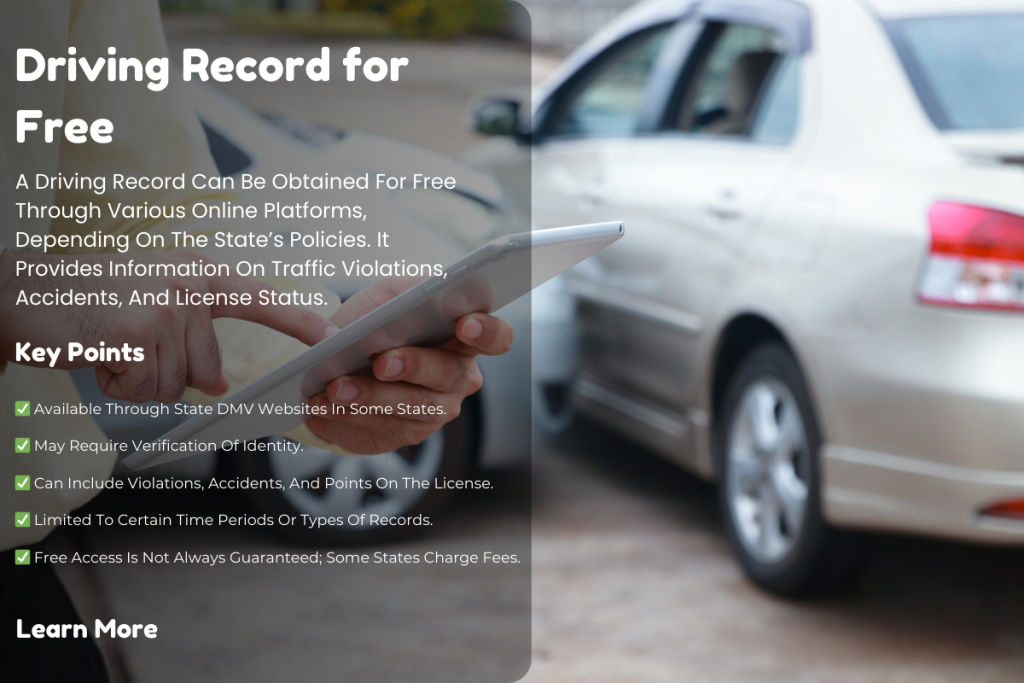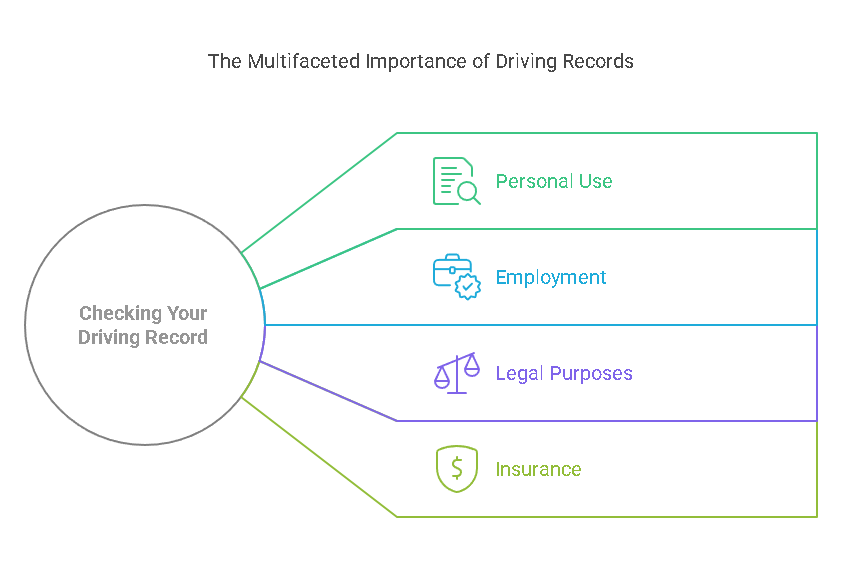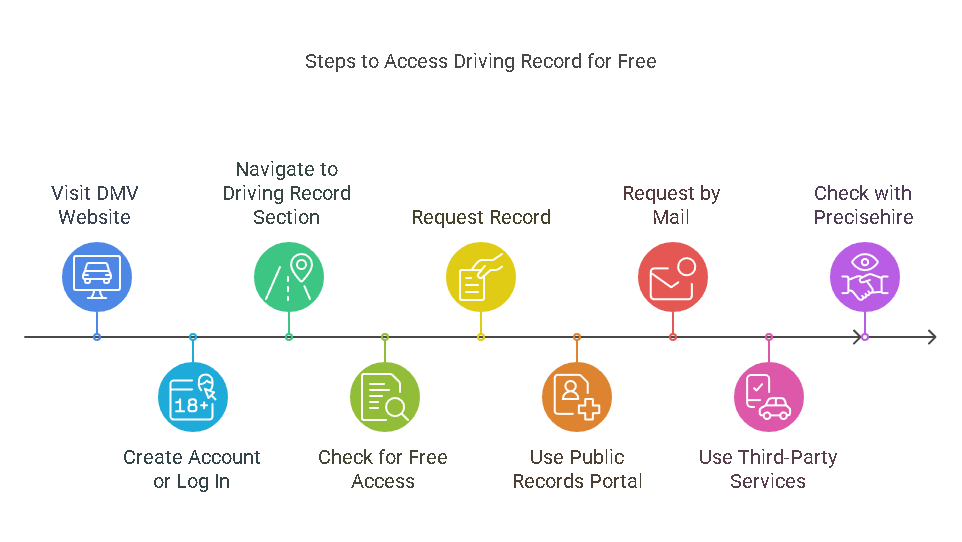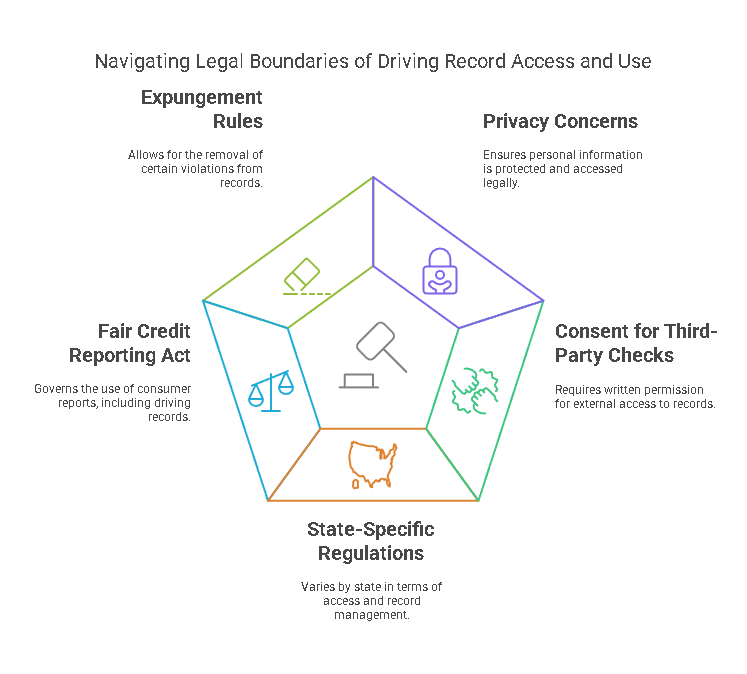The Ultimate Guide to Checking Your Driving Record for Free

Introduction to Driving Records and Their Importance
What is a Driving Record?
A driving record is a detailed history of a person’s driving activities maintained by the state or local Department of Motor Vehicles (DMV). This record tracks various elements related to your driving behavior and history, including traffic violations, accidents, license suspensions, DUI convictions, and other relevant legal or administrative actions. Think of it as a comprehensive report card of your driving life.
Driving records are often used by employers, insurance companies, law enforcement, and courts to assess a person’s driving habits, safety, and eligibility for various privileges like employment in driving positions or car insurance. They also serve as an important tool in legal situations such as disputes over accidents, traffic violations, or DUI cases.
Why is It Important to Check Your Driving Record?

There are several key reasons why it’s important to check your driving record regularly. Understanding and reviewing your driving record can be helpful for various personal, legal, and professional purposes:
- Personal Use: Reviewing your record regularly helps you stay informed about any changes, especially regarding traffic violations, accidents, or legal actions that may impact your ability to drive. For example, if you’ve forgotten about a minor violation or missed a court appearance, your driving record can alert you to these issues before they become bigger problems.
- Employment: Employers in industries like transportation, logistics, and delivery often require employees to submit their driving records for verification before hiring. Keeping track of your driving history can help you assess whether you are eligible for certain jobs that may require a clean driving record.
- Legal Purposes: In case of any disputes involving traffic violations, accidents, or other driving-related incidents, your driving record is a vital piece of evidence. It can also come in handy if you need to dispute fines, prove your driving history, or if you’re facing a suspension or revocation of your driving privileges.
- Insurance: Car insurance companies often evaluate your driving record to determine your premiums. A clean driving record may help lower your insurance rates, while a record with violations or accidents could increase your premiums. Regularly checking your record ensures that there are no surprises when it comes time to renew your policy.
What Information Does a Driving Record Typically Contain?
A driving record provides a thorough account of an individual’s driving history and may include:
- Traffic Violations: Records of any traffic citations, fines, or penalties for moving violations like speeding, running a red light, reckless driving, or other infractions.
- Accidents: Information about accidents you’ve been involved in, including details such as the date, location, severity, and whether you were at fault. Some states also report accidents regardless of fault, while others may only report those where the driver was responsible.
- DUI Convictions: If you have been convicted of driving under the influence (DUI) or a related offense, this will appear on your driving record. A DUI conviction can have long-lasting effects, including fines, license suspension, and even jail time.
- License Suspensions and Revocations: If your driver’s license has been suspended or revoked for reasons such as unpaid fines, violations, or legal matters, it will be listed on your driving record. Suspended licenses are often temporary, while revocations may be permanent.
- Points on Your License: Many states assign points to your license for traffic violations. Accumulating a certain number of points within a specific time period can result in penalties like suspension or higher insurance rates.
- Driving History and Inactivity: Your record may include the length of time you’ve held a valid driver’s license, including when you obtained it, as well as any periods of inactivity (e.g., if your license expired or you had a gap in your driving history).
Benefits of Checking Your Driving Record
Regularly checking your driving record is beneficial for several reasons:
- Spotting Inaccuracies: Mistakes happen, and sometimes incorrect information can appear on your record. Checking your record allows you to spot errors, such as accidents or violations that didn’t happen or weren’t your fault. Correcting these errors is essential to maintain a clean driving history.
- Understanding Your History: Your driving record serves as a historical snapshot of your driving habits. If you’ve accumulated violations, accidents, or points, you can take proactive steps to improve your driving behavior and avoid further penalties.
- Ensuring Eligibility for Certain Jobs: Many employers conduct background checks that include driving records, particularly for positions that involve driving company vehicles or transporting goods. A clean driving record increases your chances of securing such jobs, while violations could disqualify you.
- Lowering Your Car Insurance Premiums: If you have a clean driving record, you may be eligible for discounts on car insurance. Insurance providers often check your record to determine the premiums you’ll pay, and having a good record can result in lower rates.
- Preventing License Suspensions: If you accumulate too many points or violate traffic laws repeatedly, you may face suspension. By checking your driving record, you can ensure that you’re not in danger of exceeding the point threshold and taking action before it’s too late.
- Legal Protection: In legal disputes, such as accidents or traffic-related offenses, your driving record serves as an official document that outlines your history. It can be a critical piece of evidence when proving your side of the story or defending your driving privileges.
Checking your driving record is crucial for understanding your history, ensuring accuracy, and staying compliant with legal and employment standards. It’s an essential part of maintaining a good reputation on the road, both personally and professionally.
Step-by-Step Guide to Access Your Driving Record for Free

Checking your driving record is an essential task that can help you stay informed about your driving history and avoid any surprises, especially when applying for jobs, renewing your driver’s license, or dealing with insurance companies. Fortunately, there are several ways to access your driving record for free in most states. Here’s a step-by-step guide on how you can do it:
1. Visit Your State’s Department of Motor Vehicles (DMV) Website
The Department of Motor Vehicles (DMV) is the main government agency responsible for maintaining driving records. Most states allow you to check your driving record online, either for free or for a small fee. Here’s how you can get started:
- Go to the DMV Website: Search for your state’s DMV website (e.g., California DMV, New York DMV, Texas DMV). You can find this by doing a quick search online for “DMV [state name].”
- Create an Account or Log In: Some states require you to create an online account to access your driving record, while others may allow you to check it as a guest.
- Navigate to the Driving Record Section: Look for a section dedicated to driving records, driver history, or license status. In some cases, this may be under “Driver Services.”
- Check for Free Access: Depending on the state, you may be able to get your driving record for free, particularly if you need it for personal use or to confirm the status of your license. Free access is usually limited to certain types of records, such as a basic record showing your license status and any points.
- Request the Record: If the state offers free access, follow the instructions to request your record. If there is a fee, you will be informed beforehand.
2. Check Through Your State’s Free Public Records Portal
Some states provide access to public records through a centralized, online portal, where individuals can request basic driving records without charge. For example:
- California: California allows residents to check their driving record for free if it’s for personal use and doesn’t involve employment or legal matters.
- New York: In New York, the state’s DMV website provides free access to certain types of records, including whether your license is suspended or revoked.
To access these public records, you typically need to enter your personal information, including your driver’s license number and date of birth.
3. Request Your Driving Record by Mail
If you prefer not to use the online method or your state doesn’t offer online access for free, you can request your driving record by mail. The process generally involves the following:
- Download or Request the Form: Go to the DMV website and download the appropriate form for requesting your driving record by mail. In some cases, you can simply request the form by calling the DMV.
- Complete the Form: Fill in the required details, including your personal information, license number, and any other details required by your state’s DMV.
- Send the Form with Your ID: You may need to provide a copy of your driver’s license or other identification to confirm your identity.
- Wait for the Processing Time: The processing time for driving records requested by mail varies by state. It may take anywhere from a few days to a couple of weeks to receive your record.
4. Use Free Third-Party Services for Basic Records
While most official DMV sites are the primary sources for obtaining your driving record, there are also some third-party websites that offer free basic driving record checks. These services typically provide limited information such as:
- Driver Status: Whether your license is active, suspended, or revoked.
- Traffic Violations: Basic information about recent traffic violations or points on your record.
These third-party websites may not offer detailed reports and are usually only useful for people who need basic information quickly.
Note: Be cautious when using third-party services. Make sure they are reputable and not a scam, as some sites may ask for unnecessary fees or personal information.
5. Free Driving Record Check at Precisehire
If you’re a business or individual looking for quick and accurate driving records, consider using Precisehire. While some states may have limitations on free access, our service allows for seamless driving record checks with fast turnaround times and comprehensive data. We ensure accuracy and can quickly verify driving records for both personal and professional purposes.
Conditions and Limitations of Free Driving Record Checks
While it’s possible to access your driving record for free, there are a few conditions and limitations to keep in mind:
- Types of Records Available: Free checks may only provide basic information about your driving history, such as your current license status or a simple traffic violation summary. For a more detailed record, especially for employment or legal purposes, a fee may apply.
- State-Specific Rules: Each state has its own regulations about what information can be provided for free and how it is accessed. Some states may charge for even the most basic records, while others offer free access only for certain types of records or for personal use.
- Privacy Considerations: Some states may require you to verify your identity before providing your driving record. This can be a safeguard against identity theft and ensure that only the individual in question can access their own record.
Comparing the Process Across Different States
To help you navigate the process of obtaining your driving record for free, here’s a comparison of some states’ procedures:
| State | Free Access Available? | How to Access | Additional Information |
|---|---|---|---|
| California | Yes, for personal use | DMV Website, Online or By Mail | Basic driving history available for free |
| New York | Yes, for personal use | DMV Website, Public Records Portal | Free access to driver status and license info |
| Texas | Limited free access | DMV Website, By Mail | Full record available for a fee, limited info free |
| Florida | Yes, basic record | DMV Website | Detailed records require a fee |
| Illinois | No, requires payment | DMV Website, By Mail | Full record only available with payment |
Tips for Accessing Your Driving Record Efficiently
- Know What You Need: Before requesting your driving record, understand what information you need. If you only need to verify your license status, you may not need a full record.
- Prepare Identification: Whether you’re checking online or by mail, be ready to provide identification to verify your identity.
- Check State-Specific Rules: Each state has different rules regarding access to driving records, so make sure to follow your state’s procedure to avoid delays.
By following the steps above, you can easily check your driving record for free in many states. Make sure to use official resources like the DMV or trusted third-party services to get accurate and reliable information.
Legal Aspects of Checking Your Driving Record

While checking your driving record is often a simple process, it’s important to be aware of the legal implications surrounding the access and use of this information. Here are some critical legal considerations to keep in mind:
- Privacy Concerns: Driving records contain personal and sensitive information, so privacy is a key factor when accessing or sharing them. In most cases, only the driver is allowed to view their own driving record unless they grant permission to someone else. Third parties, like employers or insurance companies, must obtain the driver’s consent before accessing these records. States vary in the level of access allowed to third parties, and you may need to sign a release form authorizing the check.
- Consent for Third-Party Checks: If a company or employer requests to view your driving record, they must get your consent in writing. This is especially true in employment settings where a background check includes a driving record check. Without your consent, the employer cannot legally obtain this information.
- State-Specific Regulations: States have different laws on how long records are kept, who can access them, and what information is included. Some states may allow employers to check driving records only if the employee is applying for a job that involves driving. Others may allow employers to check driving records as part of a general background check, provided the applicant has signed consent.
- Fair Credit Reporting Act (FCRA): The FCRA regulates how consumer reports, including driving records, are accessed and used. If an employer conducts a background check, including a driving record check, they must follow certain procedures, such as notifying the individual of the report and providing them with an opportunity to dispute any negative findings.
- State-Specific Expungement Rules: Some states allow for the expungement or sealing of certain types of violations from your driving record, such as minor traffic offenses or accidents that did not result in charges. It’s important to know your state’s expungement rules if you’re looking to clean up your driving history.
Frequently Asked Questions (FAQs)
Here are answers to some of the most frequently asked questions regarding checking your driving record for free:
Can I check someone else’s driving record?
In most cases, no. Driving records are private and can only be accessed by the individual or by a third party with the driver’s consent. Employers, insurance companies, and law enforcement can obtain your record with your permission, but you have the right to control access to your personal driving history.
How long do violations stay on my driving record?
The length of time that violations stay on your driving record varies by state and the type of violation. Typically, minor violations (e.g., speeding tickets) stay on your record for 3 to 5 years, while more serious offenses like DUIs or felony violations can remain for 7 years or longer. Some states allow you to request the removal of certain violations after a set period, especially for non-conviction offenses.
How can I dispute incorrect information on my driving record?
If you notice incorrect information on your driving record, such as a traffic violation you didn’t commit or an accident that wasn’t your fault, you can dispute the information with your state’s DMV. Most states allow you to submit a dispute either online or by mail. Provide documentation to support your case, such as court records or police reports.
Can checking my driving record affect my insurance rates?
Simply checking your own driving record will not affect your insurance rates. However, if an insurance company accesses your driving record as part of your application, violations or accidents on your record may result in higher premiums. If you have a clean record, you may be eligible for discounts.
How long does it take to receive my driving record?
If you request your driving record online, you may receive it instantly in some states, while in others, it could take several days to process. Requests made by mail can take anywhere from 7 to 10 days to process, depending on the state.
Conclusion
Checking your driving record is an essential part of maintaining a clean driving history and staying informed about your rights and responsibilities on the road. Regularly reviewing your record can help you spot inaccuracies, ensure eligibility for certain jobs, and even lower your insurance premiums.
While it’s possible to check your driving record for free in many states, the process varies depending on your location and the type of record you need. Whether you access it through your state’s DMV, a third-party service, or request it by mail, be sure to understand the legal implications surrounding access to your personal driving history, including privacy concerns and consent requirements.
By taking the time to check your record regularly, you can ensure that it remains accurate, resolve any discrepancies, and be proactive about maintaining a clean driving history. Whether for personal, legal, or employment purposes, staying on top of your driving record is an important responsibility that can have significant benefits in the long run.
